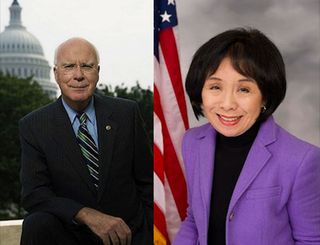Leahy, Matsui Introduce Bill to Ban Paid Prioritization

Senate Judiciary Committee chairman Patrick Leahy (pictured left) (D-Vt.) and Rep. Doris Matsui (pictured right) (D-Calif.), a member of the House communications Subcommittee, have introduced legislation in both Houses to ban paid priority.
The Online Competition and Consumer Choice Act would "prevent a two-tiered Internet system," said the legislators.
The bill would prevent an ISP from "giving preferential treatment or priority to the traffic of an edge (or content) provider over the traffic of other edge providers for a fee." The bill deals with the last mile, rather than the middle mile paid interconnection (peering) agreements that are being scrutinized by the FCC.
The bill "would require the FCC to adopt regulations that prohibit paid prioritization agreements between an ISP and an edge provider on the last mile Internet connection to the end user."
It also prohibits an ISP from prioritizing or giving preference "to the traffic of content, applications, services, or devices provided or operated by the broadband provider itself, or are otherwise affiliated with the broadband provider." The end users whose traffic can't be prioritized includes residential customers, small businesses, schools, libraries, community colleges, and universities.
“Americans are speaking loud and clear – they want an Internet that is a platform for free expression and innovation, where the best ideas and services can reach consumers based on merit rather than based on a financial relationship with a broadband provider,” said Senator Leahy, who also pointed out that he plans to hold a field hearing on network neutrality in Vermont next month.
“Our country cannot afford ‘pay-for-play’ schemes that divide our Internet into tiers based on who has the deepest pockets," said Representative Matsui.
Broadcasting & Cable Newsletter
The smarter way to stay on top of broadcasting and cable industry. Sign up below
In May, a divided FCC voted on a proposed new approach to FCC Open Internet rules that would allow commercially reasonable discrimination.
Network neutrality fans immediately jumped on that as an opening for paid prioritization that could create a bifurcated fast and slow lane Internet. FCC Chairman Tom wheeler says it is a legally sustainable way to restore the FCC's rule against unreasonable discrimination--by changing the current wording of a ban on unreasonable discrimination--bans are too much like common carrier regs--into an allowance for commercially reasonable discrimination. He has said paid priority that created fast and slow lanes would not be commercially reasonable.
The FCC's May Open Internet order also asks whether paid prioritization should be prohibited outright. That could be tricky given that some prioritization, remote medical monitoring over game playing for example, is arguably in the public interest.
While both legislators urged passage of the bill, it is unlikely to move given that the Congress is preparing to start focusing on getting itself re-elected and Republicans in control of the House are highly unlikely to agree with the Democratic duo on the need for such a ban.
Contributing editor John Eggerton has been an editor and/or writer on media regulation, legislation and policy for over four decades, including covering the FCC, FTC, Congress, the major media trade associations, and the federal courts. In addition to Multichannel News and Broadcasting + Cable, his work has appeared in Radio World, TV Technology, TV Fax, This Week in Consumer Electronics, Variety and the Encyclopedia Britannica.

